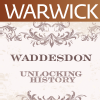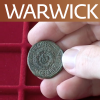-
Baron Ferdinand de Rothschild (1839-1898) filled his home at Waddesdon Manor, Buckinghamshire, with a sizable collection of eighteenth century French art and associated ephemera from the Revolution in 1789 through to the July, or Second French, Revolution of 1830. Among its collections are the Tableaux de la Révolution and a series of eighteenth century continental trade cards. The prints portray key moments in France's revolutionary period, including the storming of the Bastille and the executions of Louis XVI and Marie-Antoinette and culminate around the time of Napoleon. Academics from the University of Warwick and Queen Mary University of London helped to preserve these national treasures by digitising the content. Waddesdon Manor has used this new digital content to create a free, online catalogue so academics and the wider public can view the collections from anywhere in the world.
-
Professor Kevin Butcher from the Department of Classics and Ancient History at Warwick takes a closer look at coins from the ancient world and discovers new meanings and insight into the lives of emperors, nobles and ordinary people from this time in history.
-
Christmas is a time for celebration but the festive season was once banned in England for almost 20 years, sparking a second Civil War. University of Warwick historian Professor Bernard Capp said the ban was put in place by the Puritan government in 1647 as they believed Christmas was used as an excuse for drunkenness, promiscuity, gambling and other forms of excess.
-
Thinking Aloud is a series of debates by Warwick historians on issues of current interest. The series consists of debates among leading scholars in their field giving insights into new research on topical items. These debates will be released as downloadable podcasts. The podcasts will be supported by web resources giving further information.
-
Peter Pormann explores the world of classical Greece, Rome and beyond.
-
How did Stalin use rubles to make guns? Focusing on various aspects of the defense industry, a top-secret branch of the Soviet economy, this research provides new information on the inner workings of Stalin’s dictatorship, military and economic planning, and the industrial organization of the Soviet economy.
-
African Athena was Bernal's original title for Black Athena, his "infamous" work that has confronted the modern academy with some of the most challenging questions it has faced over the last twenty years. This interdisciplinary conference seeks neither to demonize nor lionize Bernal's book, but to open dialogue on the issues it has posed: can a myth of Afrocentrism ever be a useful narrative in contemporary culture? How do Africanizing and classicizing cultures interface and interpenetrate in the arts and lives of Africans, Europeans, Caribbeans and Americans? Does Black Athena offer new possibilities for comparison between African and Jewish diasporas, cultures and struggles? How do we deal with the difficult collusion of essentialist and poststructuralist discourses in "postcolonial" thought? These issues are only a point of departure.
-
This series examines English colonies in North America from their establishment in the early seventeenth century to their break away from Britain in the 1770s. It will examine why the English felt the need for colonial expansion in the sixteenth and seventeenth centuries, why they chose North America and how they went about creating new societies three thousand miles from home. While much of the module will be arranged chronologically, time will be set aside for the consideration of several social, ethnic, and cultural themes that do not fit quite so neatly into this format.
-
We look back now to the eighteenth and early nineteenth centuries as the time of origins of modernity -commercial and industrial revolutions, demographic transition, imperial expansion, the rise of working-class and artisan radicalism, and the emergence of the bourgeois public sphere. But this time of origins and transitions was also cast in contradictions and conflict: riches and poverty; markets and slaves; gender divisions; private life and public virtue; consumers and criminals; enlightened rationalism and religious enthusiasm, oligarchic government and popular radicalism. The eighteenth century was the great time of possibilities, opportunities, new directions and identities, but no certainties of what these were to be. This course provides an overview of these and other themes of a society creating itself anew.
-
This series builds on a knowledge of eighteenth century Europe and complements an understanding of British social, cultural, economic and political history.
-
In this podcast series Dr Beat Kümin offers the first comparative survey of early modern public houses and their unique contribution to European culture. Public houses emerge as communication spaces in a state of continuous renegotiation. As facilitators of infinite forms of human exchange, they supported rulers as easily as rebels. 'Innovative' principles like consumer choice did not need to be invented by the modern restaurant, they characterized the trade from its medieval origins. Local cultural life depended on inns just as much as the early modern communication revolution. Within a communal infrastructure featuring town halls, market squares and parish churches, public houses became the principal social sites in preindustrial Europe.
-
In this podcast series Peter Pormann of Warwick's Department of Classics and Ancient History explores the history of medical theory and practice in the medieval Islamic world.
-
A collection of podcasts and videos from the University of Warwick focussing on research stories in History, Classics and Ancient History and Art History.


